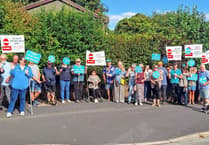CHIEF Executive Donna Manson is aiming to move Devon County Council’s children’s services department out of special measures and into to a “good” Ofsted rating in three years.
Ms Manson, who took over running the council in February last year, said she thinks children’s services is where she has made the most impact so far.
The department was rated as “inadequate” in 2020 by education watchdog Ofsted, which said at the time there were “serious failures” in the service, and that until its inspection, “senior leaders did not know about the extent of the failures to protect some of the most vulnerable children and young people from harm”.
“There are fewer children going into care, that’s fantastic, we have more children being cared for in Devon, which is fantastic as it is better for them being connected in Devon with their families, and we are much more stable as a staff team now,” Ms Manson told Radio Exe’s Devoncast podcast this week.
She said she introduced a so-called “people first” strategy over a year ago, which means that “we think about our people every day.
“We listen to staff regularly and we spend time with them, which we recently did in Barnstaple,” she said.
“It was great to sit beside staff there as they did their work and to understand what they do, their challenges and learn what their capabilities and talents are so we know what talents we have in the council and how we might be able to use them across the authority.”
The chief executive, who previously ran Scotland’s largest rural authority, The Highland Council, said recruitment and retention of children’s social care staff had improved significantly, with the number of social workers quadrupling from seven to 28.
The council had been relying heavily on costly agency staff in children’s services until recently, with the number hitting a record high (since data began in 2017) of 145 full-time-equivalent workers last year.
Ms Manson, whose salary last year was £207,000, said there were now no county council children’s services vacancies in the north of the county, “which has been unusual in areas like North Devon where we have struggled to recruit”.
She added that the authority had turned a corner in staff retention too, with a recent staff survey producing “really strong results”.
“But we are listening to suggestions of how to make things better,” she said.
“We’re in the process of 10 managers’ days at the moment, where every manager in the council comes together to hear about good practice across the council and the different areas in Devon, because we know that delivering services in different localities has to be different.”
She acknowledged that being rated as inadequate meant “people lost confidence” in children’s services.
“When you have got a label and a reputation it makes it challenging for people to want to work for you, but there has been a huge turnaround and that makes a huge difference,” she said.
She said the council is now listening to young people,” for which it had come under criticism for neglecting previously.
“That has changed and their voices are heard, and they are really direct with us about what needs to get better,” she said.
“And they are equally good at telling us when it is better.”
She praised all Devon’s eight district councils for agreeing to give care-leavers council tax exemptions, and also said the police and the health service had played important roles.
Cllr James McInnes (Conservative, Hatherleigh and Chagford), who took over as county council leader in May, agreed there had been a shift.
“The biggest change I’ve seen in the past 18 months is the senior corporate team are collectively engaged with children’s services,” he said.
“It isn’t just the officer responsible for that service, but it is other officers too going in. That’s made a tremendous change as children’s services feel supported by their colleagues and you can’t underestimate how important that is.”
Bradley Gerrard





Comments
This article has no comments yet. Be the first to leave a comment.